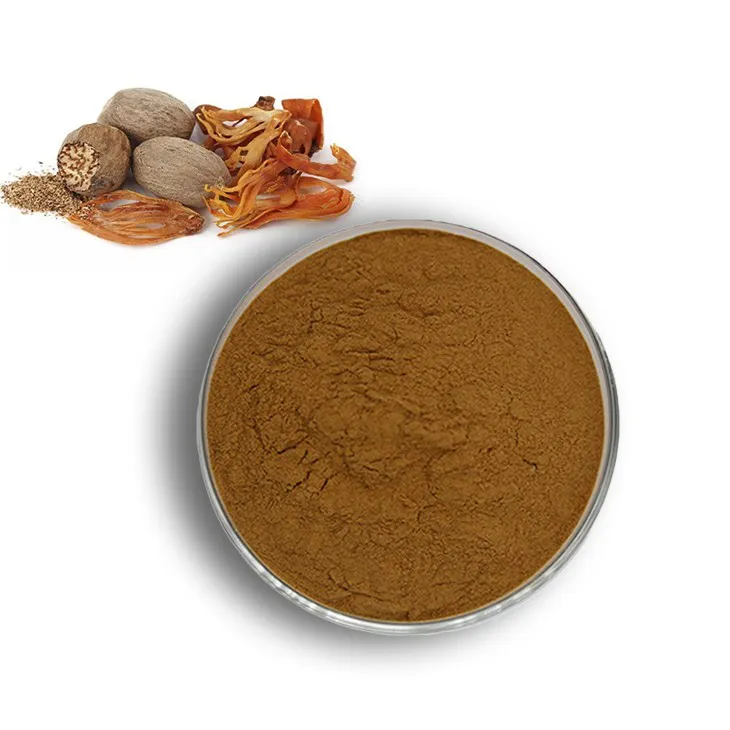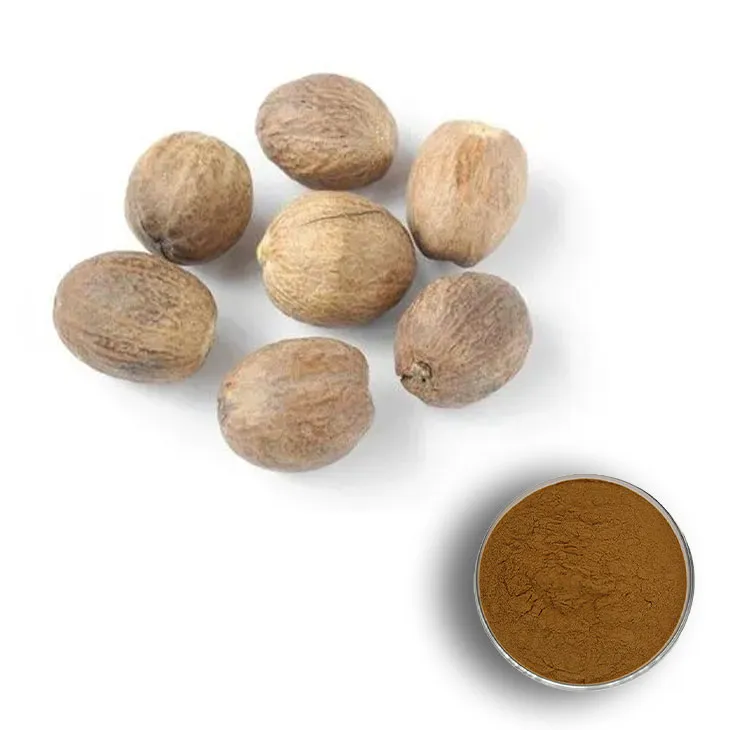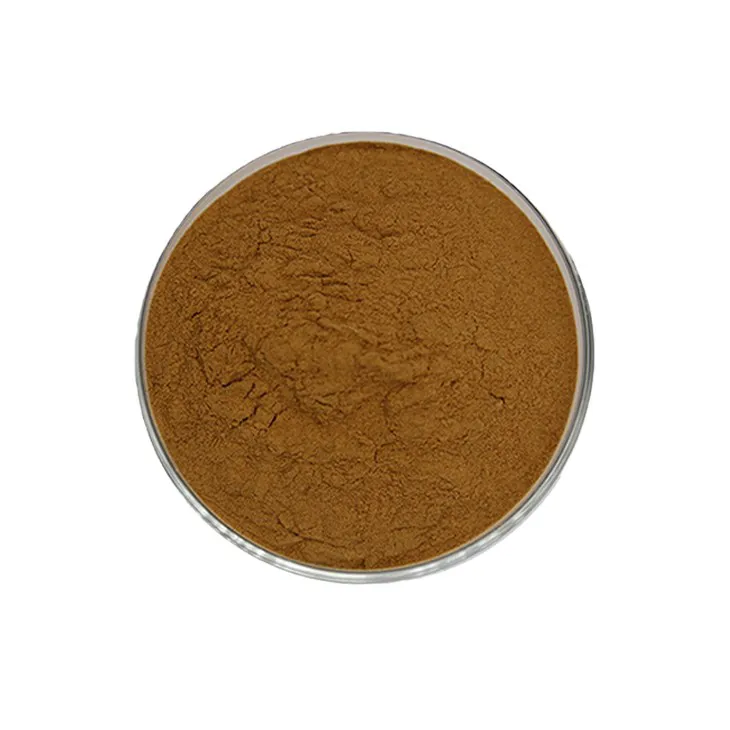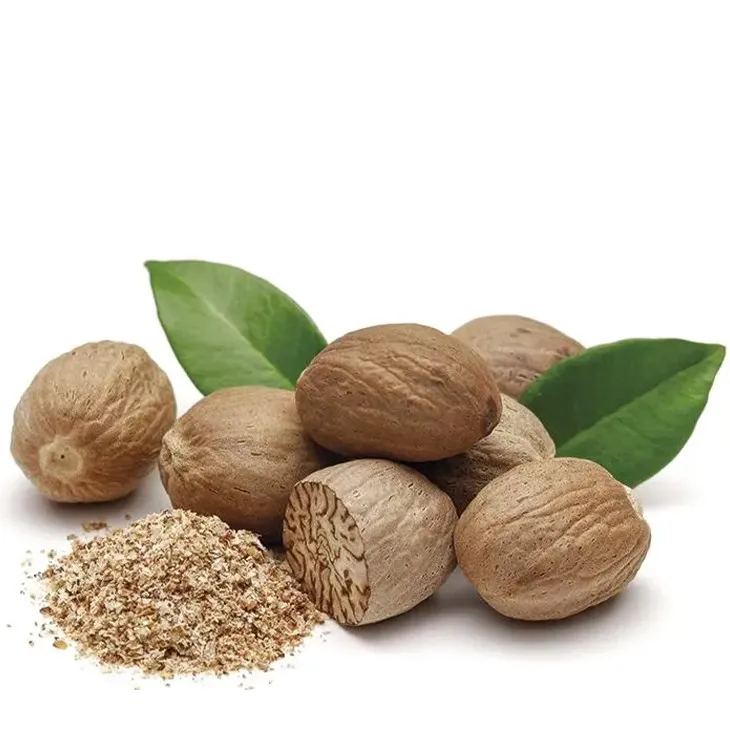- 0086-571-85302990
- sales@greenskybio.com
Use nutmeg extract to prevent diseases and enhance immunity.
2024-11-13

Introduction
In the realm of natural remedies, Nutmeg Extract has emerged as a promising agent with a wide range of potential health benefits. Derived from the nutmeg seed, this extract contains a variety of bioactive compounds that contribute to its disease - preventing and immunity - enhancing properties. This article delves into the multiple facets of Nutmeg Extract, exploring its antioxidant components, its impact on the immune system, and its role in promoting overall health and well - being.

What is Nutmeg Extract?
Nutmeg extract is obtained from the seed of the nutmeg tree (Myristica fragrans). This evergreen tree is native to the Moluccas Islands in Indonesia and is also cultivated in other tropical regions. The seed, which is the source of nutmeg, is encased within a hard, oval - shaped shell. To obtain the extract, various extraction methods are used, such as solvent extraction or steam distillation. These processes isolate the active compounds present in the nutmeg seed, concentrating their beneficial properties.

Antioxidant Components in Nutmeg Extract
1. Phenolic Compounds
Nutmeg extract is rich in phenolic compounds, which are well - known for their antioxidant activity. Phenolic acids and flavonoids are among the key phenolic components found in nutmeg. These compounds work by scavenging free radicals in the body. Free radicals are unstable molecules that can cause oxidative stress, which is associated with various diseases, including cancer, heart disease, and neurodegenerative disorders. By neutralizing free radicals, phenolic compounds in nutmeg extract help protect cells from damage and maintain their normal function.
2. Terpenes
Another group of important antioxidant components in nutmeg extract are terpenes. Examples of terpenes in nutmeg include myristicin and elemicin. These terpenes not only possess antioxidant properties but also have anti - inflammatory effects. They can help reduce inflammation in the body, which is often a precursor to many chronic diseases. Inflammation is the body's natural response to injury or infection, but chronic inflammation can disrupt normal physiological processes and lead to tissue damage.

The Impact of Nutmeg Extract on the Immune System
1. Stimulating Immune Cells
Nutmeg extract has been shown to stimulate the activity of immune cells. Macrophages, for example, are important immune cells that play a key role in the body's defense against pathogens. Nutmeg extract can enhance the phagocytic activity of macrophages, which means they are better able to engulf and destroy foreign invaders such as bacteria and viruses. Additionally, it can also influence the function of lymphocytes, another type of immune cell. Lymphocytes are involved in the adaptive immune response, which is specific to different pathogens. By modulating the function of these immune cells, nutmeg extract helps strengthen the body's immune defenses.
2. Modulating the Immune Response
In addition to stimulating immune cells, nutmeg extract can also modulate the immune response. It helps balance the immune system, preventing it from overreacting or underreacting. An overactive immune system can lead to autoimmune diseases, where the body attacks its own tissues. On the other hand, an underactive immune system makes the body more susceptible to infections. Nutmeg extract seems to have a regulatory effect, ensuring that the immune response is appropriate and effective.

Role in Preventing Specific Diseases
1. Heart Disease
The antioxidant and anti - inflammatory properties of nutmeg extract contribute to its potential role in preventing heart disease. Oxidative stress and inflammation play significant roles in the development of atherosclerosis, a condition where plaque builds up in the arteries. By reducing oxidative stress and inflammation, nutmeg extract may help prevent the formation of atherosclerotic plaques. Additionally, it may also have a positive impact on blood lipid levels. Some studies suggest that it can help lower LDL (bad) cholesterol levels while maintaining or increasing HDL (good) cholesterol levels, which is beneficial for heart health.
2. Cancer
Although more research is needed, there are indications that nutmeg extract may have anti - cancer properties. The antioxidant components in nutmeg, such as phenolic compounds and terpenes, can protect cells from DNA damage caused by free radicals. DNA damage is a key factor in the development of cancer. Moreover, some studies have shown that certain compounds in nutmeg extract can inhibit the growth and proliferation of cancer cells in vitro. However, it is important to note that these findings do not yet translate to conclusive evidence for its use as a cancer treatment in humans.
3. Neurodegenerative Diseases
Neurodegenerative diseases, such as Alzheimer's and Parkinson's disease, are characterized by the progressive loss of neurons in the brain. Oxidative stress and inflammation are also implicated in the pathogenesis of these diseases. Nutmeg extract, with its antioxidant and anti - inflammatory properties, may offer some protection against neurodegenerative diseases. It can potentially help reduce the oxidative damage to neurons and inhibit the inflammatory processes in the brain. However, again, more research is required to fully understand its effectiveness in this regard.
Promoting Overall Health and Well - being
1. Digestive Health
Nutmeg has long been used in traditional medicine to aid digestion. Nutmeg extract can stimulate the production of digestive enzymes, which are essential for breaking down food and absorbing nutrients. It also has a mild anti - spasmodic effect on the digestive tract, which can help relieve abdominal cramps and spasms. Additionally, it may have a positive impact on gut microbiota. A healthy gut microbiota is crucial for overall health, as it is involved in various physiological processes, including digestion, immune function, and even mental health.
2. Stress and Anxiety Relief
There is some evidence to suggest that nutmeg extract may have a calming effect on the nervous system. It may help reduce stress and anxiety levels. The compounds in nutmeg extract may interact with neurotransmitter systems in the brain, such as the serotonin system. Serotonin is a neurotransmitter that is associated with mood regulation. By influencing the serotonin system, nutmeg extract may contribute to a sense of relaxation and well - being.
How to Incorporate Nutmeg Extract into Your Diet
Nutmeg extract can be incorporated into your diet in several ways. One option is to use it as a flavoring agent in cooking. It can be added to baked goods, such as cakes, cookies, and pies, to add a warm, spicy flavor. It can also be used in savory dishes, such as stews and curries. Another way is to take it as a supplement. However, it is important to note that when taking nutmeg extract as a supplement, it is crucial to follow the recommended dosage, as excessive consumption of nutmeg can have adverse effects. Always consult a healthcare professional before starting any new supplement regimen.
Precautions and Side Effects
While nutmeg extract has many potential health benefits, it is not without precautions. Large amounts of nutmeg can be toxic. Symptoms of nutmeg toxicity may include nausea, vomiting, dizziness, and hallucinations. Therefore, it is important to use nutmeg extract in moderation. Additionally, individuals with certain medical conditions, such as liver or kidney disease, should be especially cautious when using nutmeg extract. Pregnant and breastfeeding women should also avoid using nutmeg extract without first consulting their healthcare provider, as its safety in these situations has not been fully established.
Conclusion
Nutmeg extract is a natural product with a wealth of potential health benefits. Its antioxidant components, impact on the immune system, and role in preventing specific diseases all contribute to its value as a natural remedy for promoting overall health and well - being. However, more research is still needed to fully understand its mechanisms of action and to confirm its efficacy in various health conditions. When used appropriately and with caution, nutmeg extract can be a valuable addition to a healthy lifestyle.
FAQ:
What are the main components in nutmeg extract that contribute to preventing diseases?
Nutmeg extract contains various components such as phenolic compounds which are known for their antioxidant properties. These antioxidants help in preventing oxidative stress in the body, which is linked to many diseases. Additionally, it may also have terpene compounds that can have antimicrobial and anti - inflammatory effects, thus contributing to disease prevention.
How exactly does nutmeg extract enhance the immune system?
Nutmeg extract can enhance the immune system through multiple mechanisms. The antioxidant components in it help protect the immune cells from damage caused by free radicals. It may also stimulate the production of certain immune cells like lymphocytes and macrophages. Moreover, its anti - inflammatory properties can prevent chronic inflammation which can suppress the immune system.
Are there any side effects of using nutmeg extract for preventing diseases?
While nutmeg extract has potential health benefits, excessive consumption can lead to side effects. In large amounts, it can cause symptoms like nausea, dizziness, and dry mouth. Also, it may interact with certain medications, so it is important to consult a healthcare provider before using nutmeg extract regularly, especially if you have pre - existing medical conditions or are on other medications.
How can one incorporate nutmeg extract into their daily diet for better health?
Nutmeg extract can be added to various foods and beverages. It can be used in baking, for example, added to cakes or cookies in a small amount. It can also be mixed into warm milk or herbal teas. However, it should be used sparingly as it has a strong flavor. Another option is to take nutmeg extract supplements, but again, this should be done under the guidance of a healthcare professional.
Can nutmeg extract replace traditional medicine for disease prevention?
Nutmeg extract cannot replace traditional medicine for disease prevention. While it has certain health - promoting properties, it is considered a complementary approach. Traditional medicine, which often includes a comprehensive diagnosis and treatment plan, is based on scientific research and clinical trials. Nutmeg extract can be used in addition to a healthy lifestyle and proper medical care, but not as a substitute.
Related literature
- The Health - Promoting Properties of Nutmeg Extract"
- "Nutmeg Extract: A Review of Its Impact on Immunity and Disease Prevention"
- "Antioxidant Components in Nutmeg Extract and Their Role in Health"
- ▶ Hesperidin
- ▶ citrus bioflavonoids
- ▶ plant extract
- ▶ lycopene
- ▶ Diosmin
- ▶ Grape seed extract
- ▶ Sea buckthorn Juice Powder
- ▶ Beetroot powder
- ▶ Hops Extract
- ▶ Artichoke Extract
- ▶ Reishi mushroom extract
- ▶ Astaxanthin
- ▶ Green Tea Extract
- ▶ Curcumin Extract
- ▶ Horse Chestnut Extract
- ▶ Other Problems
- ▶ Boswellia Serrata Extract
- ▶ Resveratrol Extract
- ▶ Marigold Extract
- ▶ Grape Leaf Extract
- ▶ blog3
- ▶ blog4
- ▶ blog5
-
Organic Tongkat Ali extract powder factory.
2024-11-13
-
How to make powder with ashwagandha extract.
2024-11-13
-
Rosehip extract manufacturers from China.
2024-11-13
-
The best cat's claw extract in nature.
2024-11-13
-
Chinese Dandelion Leaf Extract Suppliers.
2024-11-13
-
Kupilu Extract
2024-11-13
-
Beta Carotene
2024-11-13
-
Oat Straw Extract Powder
2024-11-13
-
White Peony Extract
2024-11-13
-
Gynostemma pentaphyllum extract
2024-11-13
-
Panax Ginseng Leaf Extract
2024-11-13
-
Yam Extract
2024-11-13
-
American Ginseng Root Extract
2024-11-13
-
Milk Thistle Extract
2024-11-13
-
Aminolevulinic acid
2024-11-13





















